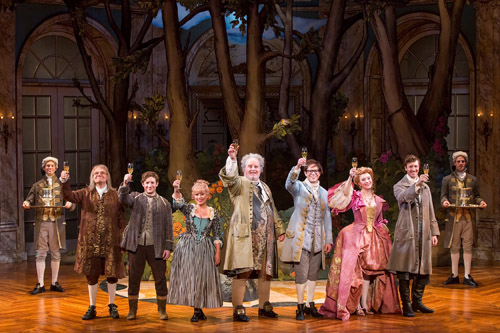
You think that wars and swords are real?
To hold a pen takes arms of steel.
By Eric George Tauber

SAN DIEGO — We all know the recipe for a classic farce:
- Lovesick fancy
- Mistaken identity
- Irreverent yet loyal servants
- A few uncanny coincidences
Bring all to a boil, then garnish with promises of marriage.
David Ives wrote Metromaniacs as a “translaptation” (slapstick + translation) of the French farce La Métromanie by Alexis Piron. Renaissance France was in love with language and poets were the rock-stars of the day. A romantic image coupled with a clever turn of phrase could turn heads and hearts to souls they’d never met. Ives throws in little anachronisms like “all that jazz” and “whatever,” plus Yiddishisms like “Oy vey” and “shlemiel” for good measure.
We enter the grand foyer of the home of Francalou set to stage a play within the play written by the famed poetess, Meriadec de Peauduncqville. Notoriously reclusive, adding to her mystique, it is rumored that she will make a personal appearance. This rumor draws an ardent admirer, Damis and his clever servant, Mondor. Damis reveres the verse of de Peauduncqville and reviles that of Francalou, never guessing that they are really one and the same. Damis writes under the nom de plume Cosmo de Cosmos, for which Lucille, Francalou’s daughter, swoons.
A young gallant, Dorante, has come to pursue Lucille, but there are two catches. His father is Francalou’s enemy and he really can’t string six words together. To woo Lucille, in a nod to Cyrano, he borrows some verses from Damis.
A clever maidservant, Lisette, mimics the dress and manner of her mistress Lucille for the play. This makes her the object of Dorante’s pursuit while the real Lucille pursues Mondor who masquerades as his master, Damis.
Enter Balieveau, the uncle of Damis who put him through college to study the law. Damis wrote verse instead of briefs. He has run up some debts and his uncle is not happy. But Damis hopes to recoup his losses with the opening of his own play and win his uncle’s forgiveness.
(Be sure to turn to the Character Map on P13 of the program to get all of this straight.)
Dina Thomas sparkles as Lisette, the cleverly manipulative maidservant who is the power behind Francalou’s throne. Likewise Christian Conn shines during his monologue as Damis recounting the hope and pathos of a disastrous opening night.
Scenic Designer James Noone painted a beautiful picture of a French Renaissance home with parquet trees and rose bushes as set pieces. Likewise Murell Horton’s costumes evoked with a vibrant palette the finery and foppery of the era.
The lines in rhyming couplets come fast and furious. They are cleverly written and delivered with great enthusiasm, but the race to the end-stop rhyme allows for no real communication. The characters are as pretty and two-dimensional as the painted forest they inhabit and as lacking in gravitas as the featherweight stones that slide when asked to support any weight. It’s a hoot and a pageant, but leaves us with little else.
Metromaniacs runs through March 13, 2016 at the Old Globe. There are post-show forums on the 9th, 16th and 24th with the cast and crew. And there’s more poetry to be heard on the plaza following weekend matinees featuring local poets and the neo-soul band, Abstrack.
*
Tauber is a freelance writer who specializes in coverage of the arts. He may be contacted via eric.tauber@sdjewishworld.com. Comments intended for publication in the space below must be accompanied by the letter writer’s first and last name and by his/ her city and state of residence (city and country for those outside the U.S.)
Pingback: Sullivan put laureate role on literary map